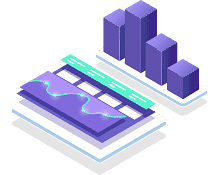Lesson 12 of 14By SimplilearnLast updated on Feb 24, 2022124620

Companies worldwide have always gathered and analyzed data about their customers to provide better service and improve their bottom lines. In today’s digital world, we are able to gather tremendous amounts of data, which require non-traditional data processing methods and software.
How to Become a Data Scientist?
Data science is the area of study that involves extracting knowledge from all of the data gathered. There is a great demand for professionals who can turn data analysis into a competitive advantage for their organizations. In a career as a data scientist, you’ll create data-driven business solutions and analytics.
Looking forward to becoming a Data Scientist? Check out the Data Science Bootcamp Program and get certified today.
Data Science at Work
Did you know that media services provider Netflix uses data science extensively? The company measures user engagement and retention, including:
- When you pause, rewind or fast-forward
- What day of the week and what time of day you watch content
- When and why you leave content
- Where in the world you’re watching from
- Your browsing and scrolling behavior
- What device you watch on
Netflix has over 120 million users worldwide! To process all of that information, Netflix uses advanced data science metrics. This allows it to present a better movie and show recommendations to its users and also create better shows for them. The Netflix hit series House of Cards was developed using data science and big data. Netflix collected user data from the show, West Wing, another drama taking place in the White House. The company took into consideration where people stopped when they fast-forwarded and where they stopped watching the show. Analyzing this data allowed Netflix to create what it believed was a perfectly engrossing show.
Now let us explore some of the important data scientist skills that an individual should possess.
7 Skills To Become A Data Scientist
To become a data scientist, you’ll need to master skills in the following areas:
- Skill 1: Gain database knowledge which is required to store and analyze data using tools such as Oracle® Database, MySQL®, Microsoft® SQL Server and Teradata®.
- Skill 2: Learn statistics, probability and mathematical analysis. Statistics is the science concerned with developing and studying methods for collecting, analyzing, interpreting and presenting empirical data. Probability is the measure of the likelihood that an event will occur.
Mathematical analysis is the branch of mathematics dealing with limits and related theories, such as differentiation, integration, measure, infinite series, and analytic functions. - Skill 3: Master at least one programming language. Programming tools such as R, Python, and SAS are very important when performing analytics in data.
R is a free software environment for statistical computing and graphics, which supports most Machine Learning algorithms for Data Analytics such as regression, association, and clustering.
Python is an open-source general-purpose programming language. Python libraries like NumPy and SciPy are used in Data Science.
SAS can mine, alter, manage and retrieve data from a variety of sources as well as perform statistical analysis on the data. - Skill 4: Learn Data Wrangling which involves cleaning, manipulating, and organizing data. Popular tools for data wrangling include R, Python, Flume, and Scoop.
- Skill 5: Master the concepts of Machine Learning. Providing systems with the ability to automatically learn and improve from experience without being explicitly programmed to. Machine Learning can be achieved through various algorithms such as Regressions, Naive Bayes, SVM, K Means Clustering, KNN, and Decision Tree algorithms to name a few.
- Skill 6: Having a working knowledge of Big Data tools such as Apache Spark, Hadoop, Talend, and Tableau, which are used to deal with large and complex data which can’t be dealt with using traditional data processing software.
- Skill 7: Develop the ability to visualize results. Data visualization integrating different data sets and creating a visual display of the results using diagrams, chart, and graphs
Data Scientist Master’s Program
In Collaboration with IBMEXPLORE COURSE

Careers in Data Science
Once you’ve mastered these skills, you’ll have a range of career opportunities available. Prepare for a job interview with our data science interview questions.
Data Scientist
Average salary: $120,931
Data scientists create data-driven business solutions and analytics by driving optimization and improvement of product development. They use predictive modeling to increase and optimize customer experiences, revenue generation, ad targeting, and more. Data scientists also coordinate with different functional teams to implement models and monitor outcomes.
Data Engineer
Average salary: $137,776
Data engineers assemble large, complex data sets. They identify, design, and implement internal process improvements and then build the infrastructure required for optimal data extraction, transformation, and loading. They also build analytics tools that utilize the data pipeline.
Data Architect
Average salary: $112,764
Data architects analyze the structural requirements for new software and applications and develop database solutions. They install and configure information systems and migrate data from legacy systems to new ones.
Data Analyst
Average salary: $65,470
Data analysts acquires data from primary or secondary sources and maintain databases. They interpret that data, analyze results using statistical techniques, and develop data collections systems and other solutions that help management prioritize business and information needs.
Free Course: Python Libraries for Data Science
Learn the Basics of Python LibrariesENROLL NOW

Business Analyst
Average salary: $70,170
Business analysts assist a company with planning and monitoring by eliciting and organizing requirements. They validate resource requirements and develop cost-estimate models by creating informative, actionable and repeatable reporting.
Data Administrator
Average salary: $54,364
Data administrators assist in database design and update existing databases. They are responsible for setting up and testing new database and data handling systems, sustaining the security and integrity of databases and creating complex query definitions that allow data to be extracted.
Preparing for a Career in Data Science
Simplilearn’s Artificial Intelligence and Data Science course is an integrated program in AI and data science that includes the following intense courses to prepare you for an exciting career in data science:
- Data Science with Python
- Machine Learning
- Deep Learning
- Tableau
- Computer Vision
Mastering the field of data science begins with understanding and working with the core technology frameworks used for analyzing big data. You’ll learn the developmental and programming frameworks Hadoop and Spark used to process massive amounts of data in a distributed computing environment, and develop expertise in complex data science algorithms and their implementation using R, the preferred language for statistical processing. The insights you will glean from the data are presented as consumable reports using data visualization platforms such as Tableau.
Once you have mastered data management and predictive analytic techniques, you will gain exposure to state-of-the-art machine learning technologies. This expansive data science learning path will help you excel across the entire spectrum of big data and data science technologies and techniques.
Simplilearn’s Data Science course is exhaustive, and earning a certificate is proof that you have taken a big leap in mastering the domain. The knowledge and skills you’ll gain working on projects and simulations and examining case studies will set you ahead of the competition.
